The Role of Outpatient Care in Emotional and Mental Health Recovery
Outpatient treatment plays a crucial role in supporting individuals recovering from substance abuse and co-occurring mental health conditions. By offering structured yet flexible care, outpatient programs enable patients to engage actively in their recovery while maintaining daily life responsibilities. This article explores how outpatient treatment promotes emotional healing, fosters long-term recovery, and integrates comprehensive services to address the multifaceted nature of addiction and mental health challenges.
Understanding Comprehensive Treatment Services for Addiction and Mental Health
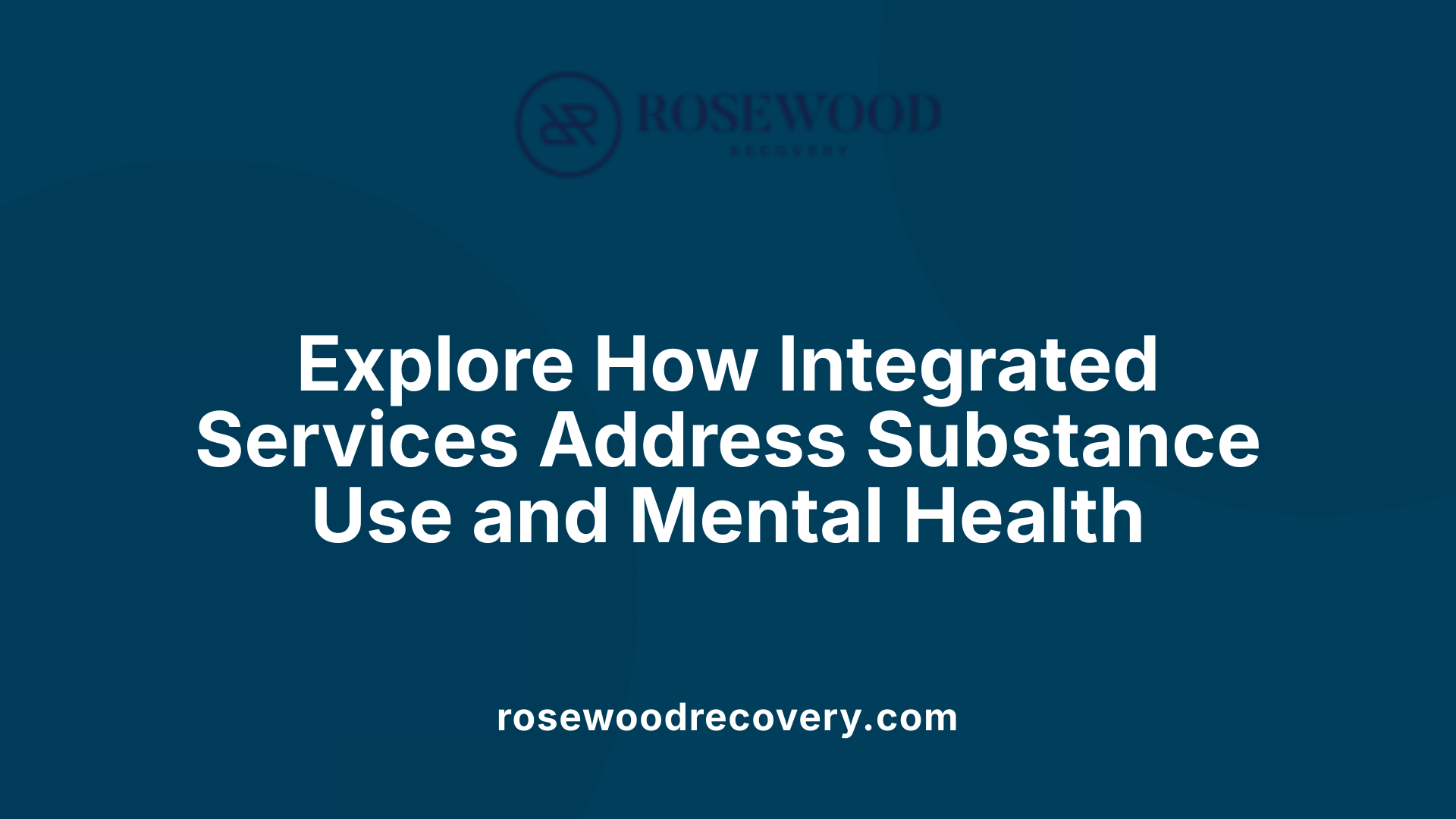
What Are Comprehensive Treatment Services for Substance Abuse and Mental Health Issues?
Comprehensive treatment services combine medical, therapeutic, and support strategies to address substance abuse and mental health issues simultaneously. This integration is vital because many individuals experience co-occurring disorders such as addiction alongside conditions like depression, anxiety, or PTSD.
These services include various components:
- Medical Support: Includes medication-assisted treatment (MAT) using FDA-approved medications to manage withdrawal symptoms and cravings.
- Therapeutic Approaches: Evidence-based counseling, behavioral therapies, and psychosocial interventions tailored to individual needs.
- Support Systems: Peer support groups, family involvement, and community resources are critical for emotional and social healing.
Integration of Mental Health and Substance Use Care
Recognizing the link between addiction and mental health, comprehensive treatment ensures both are tackled together. Programs such as dual diagnosis care provide simultaneous attention to these challenges, enhancing treatment effectiveness and recovery outcomes.
Components of Comprehensive Treatment
Treatment modalities range from outpatient programs such as intensive outpatient programs (IOPs) or drug-free outpatient services, to residential and inpatient care where needed. Flexible outpatient settings allow individuals to receive services while living at home, balancing daily responsibilities and recovery efforts. Key elements include:
- Clinical guidelines supported by scientific research.
- Holistic therapies addressing trauma and emotional healing.
- Continued participation in therapy and self-help groups post-treatment.
Resources Supporting Recovery
SAMHSA promotes critical resources such as the 988 Suicide & Crisis Lifeline and the Disaster Distress Helpline for immediate support during emotional crises. Additionally, public health initiatives like Substance Use & Misuse Prevention Month and the RecoverMe Campaign foster community engagement and awareness. Information platforms like FindTreatment.gov help individuals locate appropriate treatment services.
Together, these comprehensive and integrated services create a supportive framework that not only targets substance use and mental health symptoms but also aids in building long-term resilience and a fulfilling recovery journey.
How Outpatient Programs Tailor Addiction Treatment for Emotional Healing
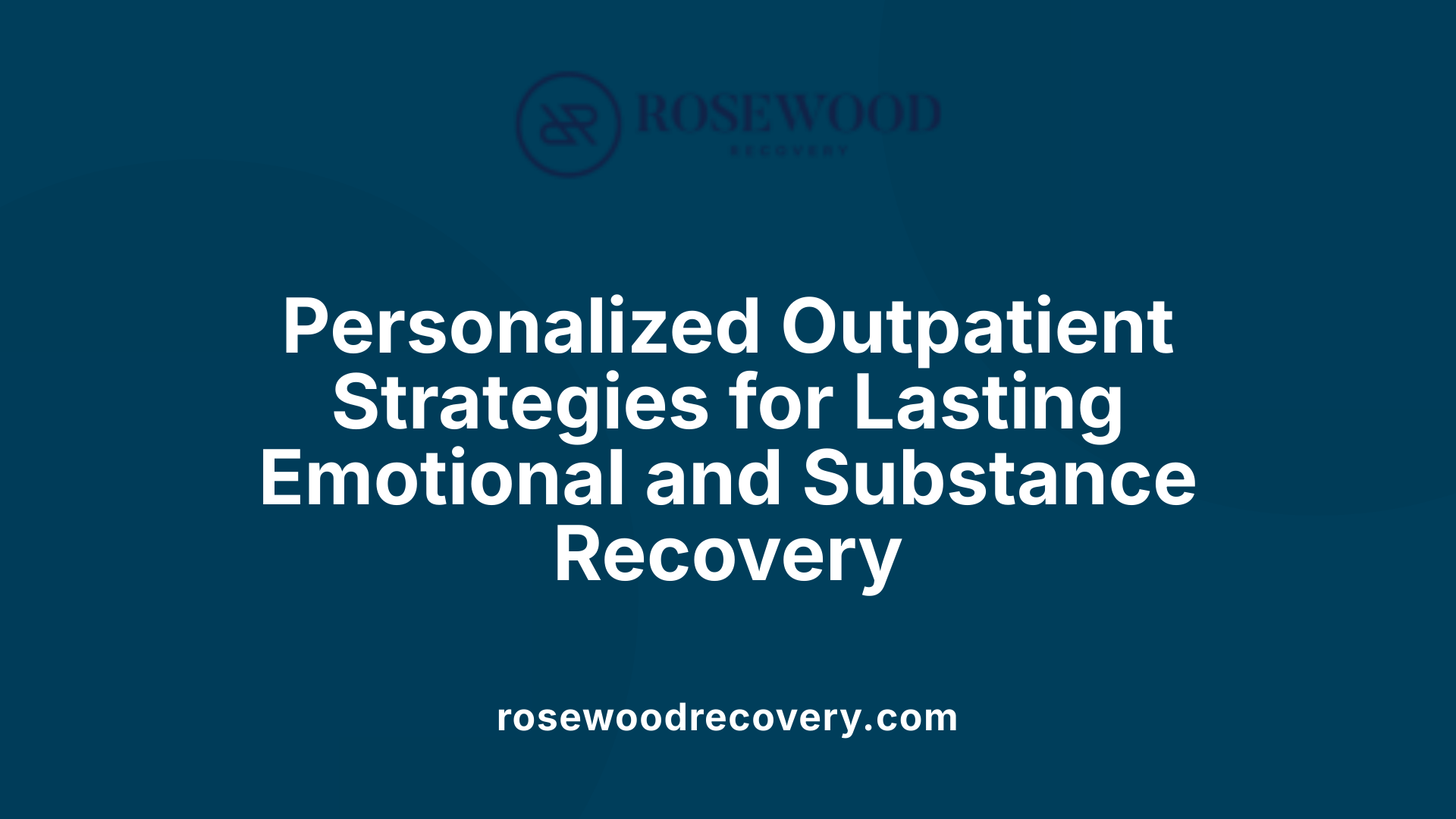
Individualized, Evidence-Based Interventions
Outpatient addiction treatment programs emphasize personalized care tailored to the unique needs of each individual. These interventions rely on evidence-based practices to ensure effective recovery. Programs assess the specific substance or behavior involved and design treatment plans that combine various therapeutic approaches suited to the patient’s stage of recovery.
Behavioral Therapies Such as CBT and DBT
Core behavioral therapies incorporated into outpatient care include cognitive-behavioral therapy (CBT) and dialectical behavior therapy (DBT). CBT helps patients recognize and change destructive thought patterns, while DBT teaches emotional regulation and distress tolerance skills. These therapies address the psychological and emotional challenges at the root of addiction and equip individuals to manage triggers and cravings.
Role of Medication-Assisted Treatment (MAT)
Medication-assisted treatment forms a critical element of outpatient programs. FDA-approved medications like methadone, buprenorphine, and naltrexone assist in managing withdrawal symptoms and reducing cravings. When combined with counseling and therapy, MAT enhances treatment success and supports physical and emotional healing.
Family Therapy and Community Support Integration
Outpatient settings often involve family therapy and integrate community resources to strengthen the social environment. Family participation addresses relational issues and rebuilds trust, fostering emotional recovery. Peer support groups, national helplines, and public health campaigns provide ongoing encouragement and reduce feelings of isolation.
Recognizing Addiction as a Chronic, Treatable Disease
Programs approach addiction as a chronic, treatable condition requiring comprehensive, whole-person care. This perspective includes managing co-occurring mental health disorders, addressing trauma, and focusing on sustained recovery through relapse prevention and resilience building.
| Treatment Aspect | Description | Purpose/Benefit |
|---|---|---|
| Individualized Interventions | Tailored plans based on substance and personal history | Enhances relevance and effectiveness of treatment |
| Behavioral Therapies | CBT, DBT, experiential therapies | Develop coping skills, emotional regulation, trauma processing |
| Medication-Assisted Treatment | Use of methadone, buprenorphine, naltrexone | Manages withdrawal/cravings, supports physical healing |
| Family & Community Support | Incorporates family therapy, peer groups, national helplines | Strengthens relationships, reduces isolation |
| Chronic Disease Model | Addiction treated as ongoing condition requiring integrated care | Promotes sustained recovery and relapse prevention |
The Unique Advantages of Outpatient Treatment in Fostering Emotional Wellness
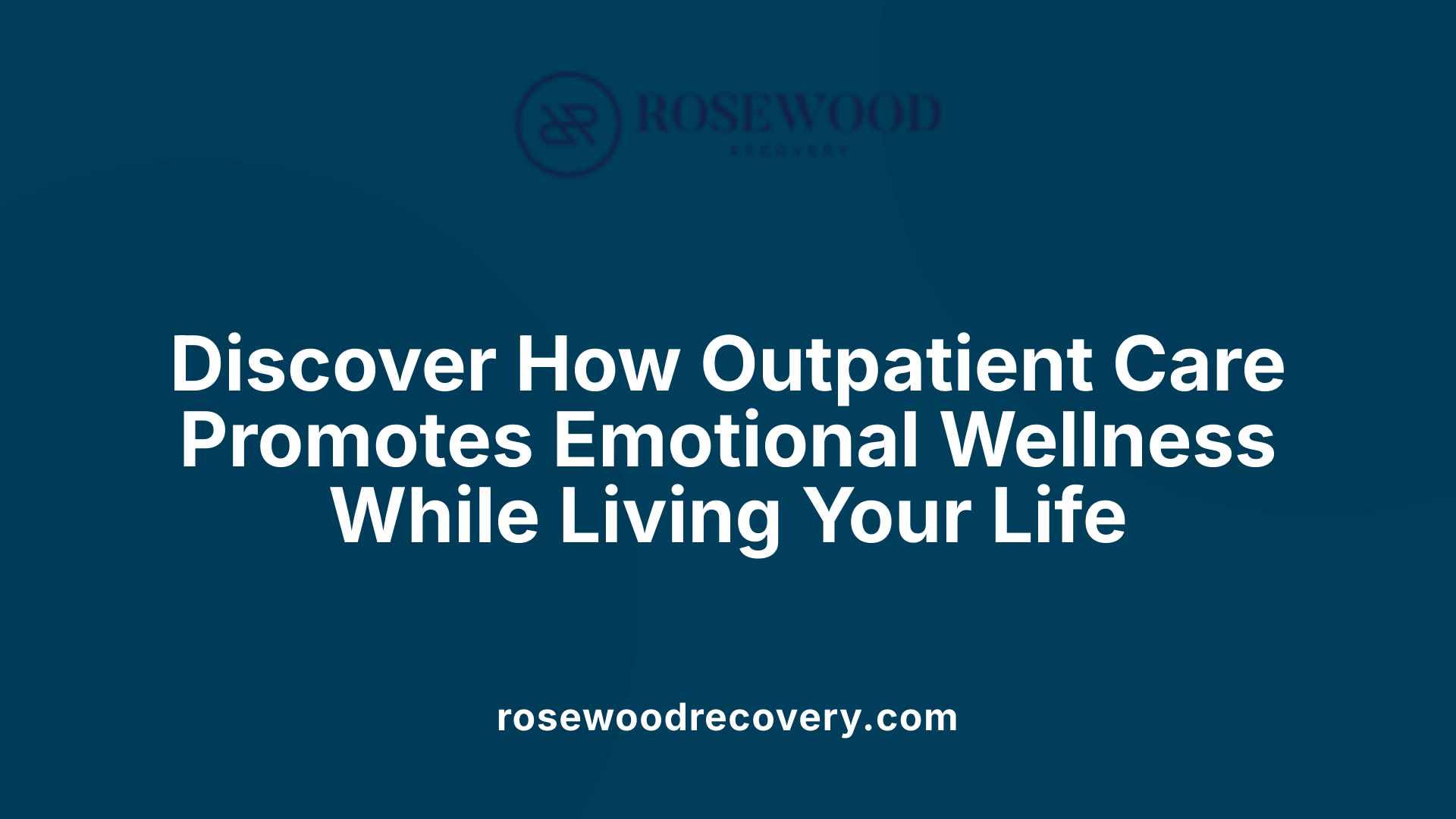
Living at Home While Receiving Structured Care
Outpatient treatment allows individuals to remain in the comfort of their own homes while receiving professionally structured support. This setup facilitates real-world application of recovery skills without the isolation often associated with inpatient care.
Balance Between Flexibility and Accountability
Programs such as Intensive Outpatient Programs (IOPs) provide a framework that combines flexible scheduling with necessary accountability. Patients attend therapy sessions, educational workshops, and group support regularly, which fosters responsibility and consistent engagement.
Maintenance of Employment, Education, and Family Roles
Outpatient treatment enables individuals to maintain their daily responsibilities like work, school, and family commitments. This continuity supports emotional stability by preserving life routines and social connections critical for holistic recovery.
Practice and Reinforcement of Coping Skills in Real Life
Being embedded in everyday environments allows patients to practice and reinforce coping strategies as they encounter real-life challenges. This approach enhances emotional healing by supporting resilience and problem-solving in context.
Affordability and Reduced Financial Barriers
Compared to inpatient care, outpatient programs are more affordable and accessible. This reduces financial stress and encourages early intervention, making mental health and substance use treatment attainable for a broader population.
Intensive Outpatient Programs: Structure, Effectiveness, and Community Support
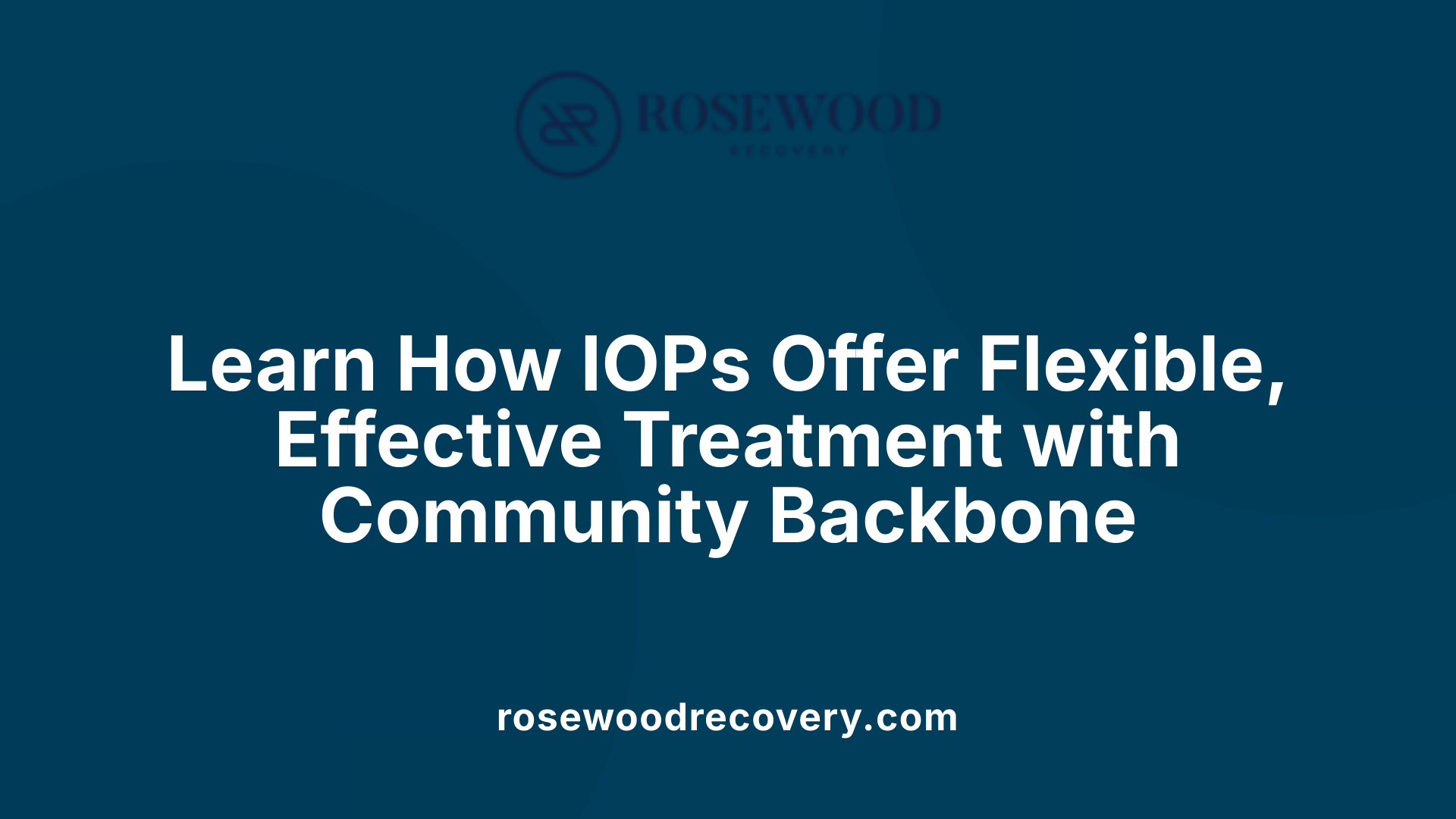
What Are the Core Components of IOP Services?
Intensive Outpatient Programs (IOPs) are designed to provide comprehensive care for individuals with substance use disorders who do not need medical detoxification or 24-hour supervision. Generally, IOPs offer at least 9 hours of structured therapy per week. These include individual therapy, group sessions, and family therapy, enriching the recovery process through diverse perspectives and support systems.
In addition to therapeutic interventions, psychoeducation is a vital element of IOPs. Patients receive education on substance use and mental health disorders, empowering them to understand and manage their conditions more effectively.
How Does IOP Effectiveness Compare to Inpatient Care?
Multiple rigorous studies, including randomized controlled trials, confirm that IOPs are as effective as inpatient or residential treatment for many individuals. Outcomes such as reductions in substance use and problem severity are comparable. This highlights IOPs as a flexible alternative that maintains treatment quality without requiring residential stays.
Furthermore, research shows consistent effectiveness across various populations and settings—from hospital- to community-based facilities—indicating the broad applicability of IOP models.
What Role Do Peer Support and Community Engagement Play?
Peer support is integral to IOPs, fostering understanding, accountability, and a sense of belonging. Group therapies and community-based peer recovery groups reduce feelings of shame and isolation, which often accompany addiction recovery.
Community engagement through education and support networks enhances the overall recovery experience. This connection not only aids emotional healing but also strengthens continuous participation post-treatment.
Why Is Standardization and Multidimensional Treatment Important?
Although there is variability in how IOPs are delivered, evidence suggests standardizing core components, including pharmacotherapy with behavioral therapies, would improve overall service quality and outcomes.
Multidimensional approaches within IOPs address physical health, psychological needs, emotional support, and social relationships. Integrating these aspects ensures a holistic approach, crucial for long-lasting recovery.
| Aspect | Description | Impact on Recovery |
|---|---|---|
| Therapy Types | Individual, group, family therapy | Supports personalized recovery and social healing |
| Minimum Service Hours | At least 9 hours per week | Provides adequate intensity without inpatient stay |
| Psychoeducation | Education on substance use and mental health | Empowers informed self-management |
| Peer Support & Community | Group sessions and peer groups | Enhances accountability and emotional support |
| Standardization Efforts | Incorporating pharmacotherapy with behavioral therapy | Improves consistency and effectiveness |
Integrating Trauma-Informed Care and Emotional Healing in Outpatient Settings
Why is it important to address trauma alongside addiction?
Addressing trauma alongside addiction is essential because unresolved trauma often contributes to continued substance abuse. Trauma can deeply affect emotional regulation and impulse control, which are critical areas involved in addiction. Without treating trauma, the risk of relapse and emotional challenges remains high, making recovery incomplete.
How does trauma affect the brain and emotional regulation?
Trauma can alter brain structures related to emotion regulation, impulse control, and decision-making. These changes increase vulnerability to addiction by impairing an individual's ability to manage stress and cravings effectively. Trauma also triggers powerful feelings of shame, worthlessness, and isolation, which individuals may try to manage through substance use, complicating recovery efforts.
What holistic treatment practices support emotional healing?
Holistic outpatient treatment often incorporates a mix of talk therapy, medication management, and mindfulness practices. These approaches help individuals process trauma, reduce substance cravings, and develop healthier coping skills. Group therapy and individual counseling also promote emotional healing by fostering accountability and providing a safe space to explore underlying issues.
How do outpatient programs help reduce shame and isolation while promoting social connection?
Outpatient programs frequently include peer support groups and family involvement, which build social support networks. Sharing experiences with others facing similar challenges helps diminish feelings of shame and isolation. Multidimensional family therapy and Certified Peer Recovery Specialists further strengthen emotional and social recovery by creating understanding and connectedness.
What are examples of tailored outpatient programs addressing trauma?
Programs like BOLD Health in San Diego offer physician-led outpatient rehab specifically designed to treat both substance abuse and trauma. These tailored, integrated plans emphasize trauma-informed care within outpatient settings, combining medical, psychological, and social support to foster lasting recovery and emotional wellbeing.
| Topic | Details | Impact on Recovery |
|---|---|---|
| Trauma and Addiction | Unresolved trauma increases addiction vulnerability by affecting brain and emotional regulation | Treatment success depends on addressing trauma |
| Holistic Therapies | Combine therapy, medication, and mindfulness to support emotional healing | Encourages comprehensive recovery |
| Social Connection | Peer groups and family therapy reduce isolation and shame | Enhances motivation and emotional support |
| Tailored Outpatient Programs | Specialized programs like BOLD Health offer integrated trauma-informed care | Supports sustained recovery and well-being |
The Role of Peer Support and Family Therapy in Sustaining Emotional Recovery
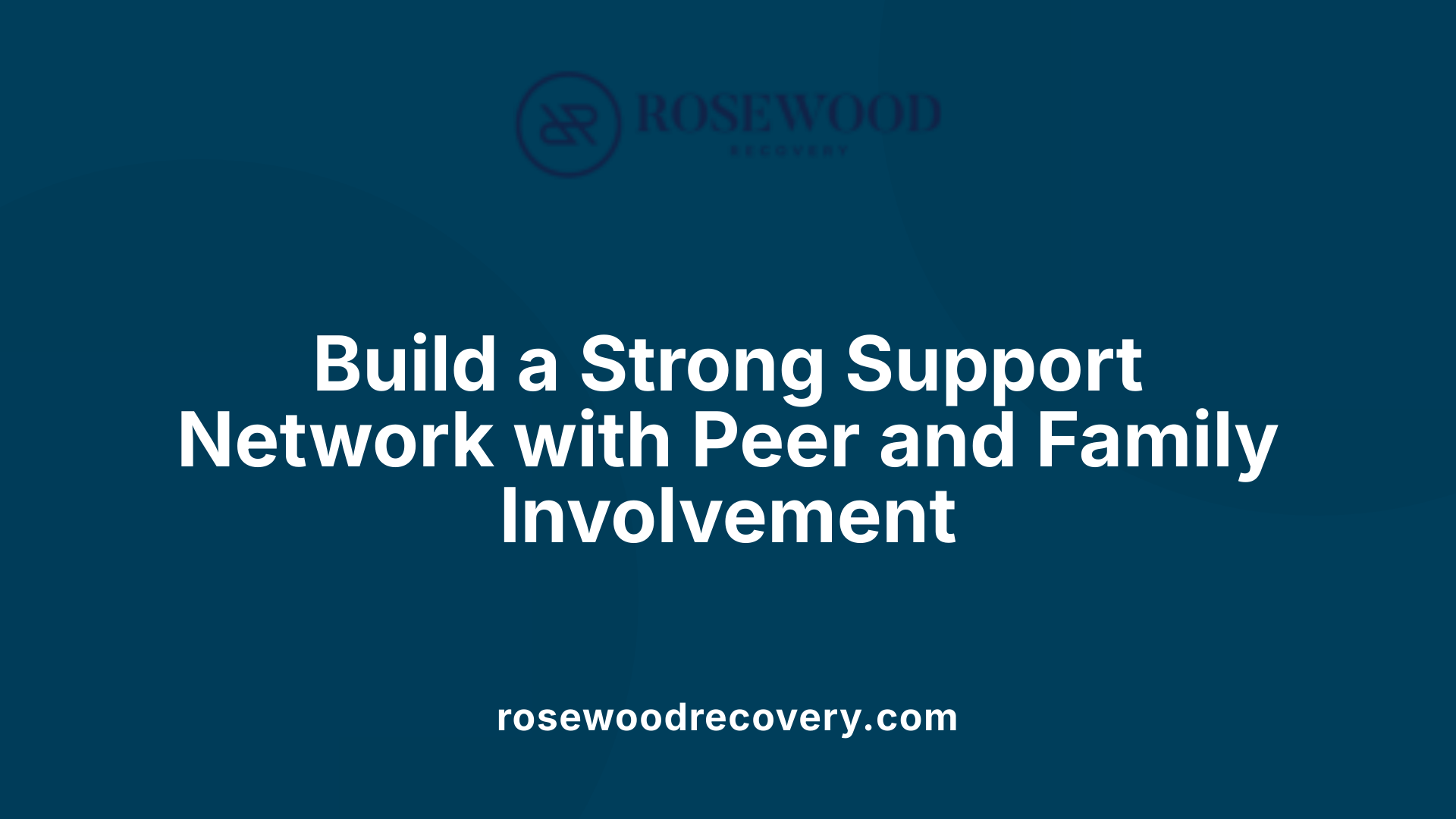
How do Certified Peer Recovery Specialists and community-based resources contribute to outpatient treatment?
Certified Peer Recovery Specialists (CPRS) play an essential role in outpatient addiction treatment by providing connection, understanding, and accountability. They offer lived experience support, helping individuals navigate the emotional challenges of recovery. Community-based resources further reinforce this support system, fostering social integration and engagement that are vital for emotional healing.
Why is family involvement important in therapy and educational services?
Family involvement in therapy and educational programs is a cornerstone of comprehensive outpatient treatment. Multidimensional family therapy addresses emotional and relational issues by improving communication, rebuilding trust, and establishing healthy boundaries. Educating families about addiction and recovery processes empowers them to support their loved ones effectively, creating a stable environment conducive to sustained recovery.
How do peer support and family therapy help build social support networks?
These elements work together to strengthen social support networks by encouraging shared experiences, mutual empathy, and encouragement. Peer groups reduce feelings of isolation and shame by connecting individuals with others facing similar struggles. Family therapy further nurtures closer bonds that are crucial for ongoing emotional and social stability.
What strategies support long-term recovery maintenance through peer and family involvement?
Continued participation in peer support groups and family therapy sessions post-treatment significantly contributes to maintaining sobriety and emotional wellness. Regular engagement promotes accountability and helps individuals develop resilience and coping skills necessary to manage real-world challenges.
What benefits do emotional and relational healing bring to recovery?
Healing emotional wounds and improving relationships foster a supportive atmosphere that reduces relapse risk. Addressing trauma and relational conflicts through therapy facilitates emotional stability, self-worth, and healthier social interactions, all crucial for sustained recovery.
Together, Certified Peer Recovery Specialists, family therapy, and community resources form a comprehensive support network that underpins emotional healing and long-term success in outpatient addiction treatment.
Outpatient Treatment: A Balanced Approach to Emotional Healing and Sustainable Recovery
Outpatient treatment offers an effective, accessible, and compassionate approach to healing the emotional wounds of addiction and mental health challenges. Through personalized care, integration of evidence-based therapies, medication management, and robust support systems including peer and family involvement, outpatient services foster resilience, promote independence, and reduce barriers to recovery. Intensive outpatient programs provide structured environments for growth, while trauma-informed care addresses the root causes of substance use, enhancing emotional well-being. Ultimately, outpatient treatment empowers individuals to rebuild their lives within their communities, sustaining emotional healing and long-term sobriety.
References
- Home | SAMHSA - Substance Abuse and Mental Health ...
- Chapter 5—Specialized Substance Abuse Treatment ...
- Flexible Outpatient Care for Addiction Recovery
- Substance Abuse Intensive Outpatient Programs
- What is Addiction Recovery and Why is it Important?
- Seven Benefits of Outpatient Treatment for Opioid Addiction
- How an IOP Supports Healing for Trauma and Addiction
- Home | SAMHSA - Substance Abuse and Mental Health ...
- Addiction Treatment Methods | Evidence-Based Practices




